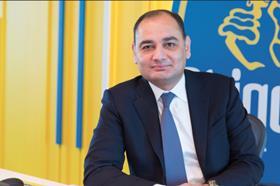
Chiquita recently unveiled a new logistics service for northern Europe, which is part of the company’s shift from using conventional reefer ships to employing only container vessels. Why does this service need to be as fast as three days across the Atlantic, when it has very sophisticated ripening facilities and just-in-time delivery that can time the fruit’s arrival in the market well enough already? Is this not a system that has already been perfected?
Carlos Lopez Flores: It is, but the banana is a very delicate fruit. Consumers are very demanding and we want to make sure that we support what we believe to be behind the blue sticker. Short transit times are the best, not just for the quality of the fruit but because they give us flexibility as well. The demand is very volatile in bananas, so the faster you are the better you can manage the supply to your customer. Yes, it’s a big investment and yes we could look to leverage back-haul cargo, which is something that was raised in our press conference at Fruit Logistica [2019, in February], but our priority is to get this banana to the market as soon as we can.
So are you saying that the side issues in terms of logistics, for example the extra potential fuel cost relating to running a new container ship, almost don’t matter? Does speed really translate into better products?
CLF: It does, yes. In terms of flavour, in terms of appearance, absolutely. Most importantly, it also reduces waste in bananas. It’s a reality that for companies importing bananas there is a percentage that end up being thrown away because of age. We want to minimise that. The fresher the banana is, the more will end up on the shelf.
Let’s turn to the recent discussion about Tropical Race 4 (TR4) and its devastating effect on banana production. Why has Chiquita decided to take such an active role in supporting research in this area?
CLF: Six months ago we sponsored the first conference on TR4 in Boston, because a lot of R&D and investigation has been done but it hasn’t been coordinated well. So we got all [the scientists] together. Our objective is to sponsor this and to become the leaders on research into TR4. Even though it is not impacting Latin America where we have our plantations, we do see it coming. We have experience of when this happened 60 years ago and we don’t want to go through that again. We have partnered with Professor Gert Kema at Wageningen University, who is establishing a group called KeyGene that will do a lot of cross-breeding to find a variety that will be resistant to a lot of diseases.
Has Chiquita itself invested in KeyGene?
CLF: Right now we are establishing the vehicle that we will use – a foundation or something like that – and how we all come together and who runs it.
So it will be a partnership involving Chiquita?
CLF: Exactly. We’re just leading that and trying to get all the key stakeholders together.
TR4 is not the only disease that has come Cavendish’s way. Do you think your project will tackle other areas of concern besides TR4?
CLF: That’s a good question. Many diseases like Black Sigatoka we have learned to live with, but that doesn’t mean the way we handle it is the best way. We expect from these cross-breeding efforts also to find solutions for Black Sigatoka, or find bananas with different flavours or shapes that we will have some commercial value. Cavendish has been with us for 60 or 70 years and it’s still the same. So we will also look at these opportunities.
Cavendish remains the only game in town for now though. What future developments can we expect in ten or twenty years from now? Could we see a new variety sold under the Chiquita label?
CLF: That’s our intention, especially with this effort with TR4. Other varieties will come that are commercially viable. There are more than a hundred types of banana across the world, however our consumers have become accustomed to Cavendish. So we need to find something that is different, but not so different that it won’t have any commercial value.
Is the ultimate goal to have a Chiquita banana that is a protected, licensed fruit belonging to the company itself?
CLF: No, we don’t see it that way. We would share the research, because it’s about survival of the industry, not about the survival of Chiquita. More than 400m people depend on this industry, so it would be very selfish of us to say a new variety is just for us.
Finally, what chance do you see to increase your sales in Europe?
CLF: Western Europe and Europe in general is a very mature market. Household penetration is probably in the region of 75-80 per cent. Secondly, bananas are a hundred year-old product. So our consumption here grows with the population. Our own market share is significant – we are the market leader in Europe – so we don’t see many opportunities to increase our distribution in the market at this stage.
This interview first appeared in the April 2019 issue of Eurofruit Magazine. For details of how to subscribe to Eurofruit, visit fruitnet.com/eurofruit/subscribe



